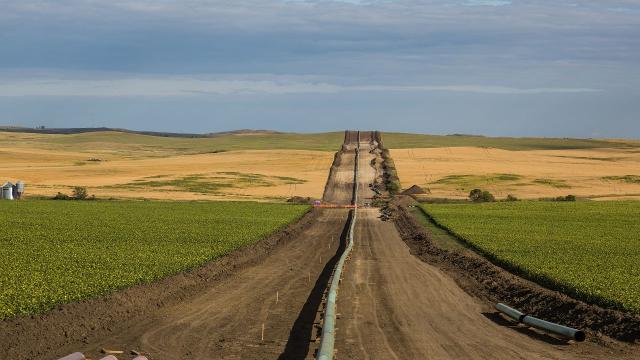McClatchy D.C. Bureau
Dakota Access builder and Corps object to tribal proposal
Associated Press November 02, 2017
Bismarck, N.D. The builder of the Dakota Access oil pipeline and the federal agency that permitted the project are objecting to an effort by American Indian tribes to bolster protections for their water supply.
Lawyers for Texas-based Energy Transfer Partners and the Army Corps of Engineers argue separately in documents filed Wednesday in federal court in Washington, D.C., that the proposals by the Standing Rock Sioux and Cheyenne River Sioux are unnecessary or unwarranted.
“Measures are already in place to achieve the objectives behind each proposed set of conditions,” company attorneys wrote.
The dispute centers around the $3.8 billion pipeline’s crossing of the Missouri River’s LakeOahe reservoir in southern North Dakota.
Both tribes get water from the lake and fear contamination should the pipeline leak. They are among four Dakotas tribes suing to shut down the pipeline that began moving North Dakota oil to a distribution point in Illinois on June 1.
U.S. District Judge James Boasberg is requiring the Corps to further review the project’s impact on tribal interests, but he’s allowing oil to continue flowing while that work is done over the next several months. In the meantime, the tribes are seeking increased public reporting of pipeline issues such as repairs, and implementation of an emergency spill response plan at the lake crossing with tribal input. The spill response plan will include equipment staging.
ETP said it already has emergency equipment and personnel staged “near” the crossing and has also “taken steps to include the tribes in response planning.” The company said it is willing to continue working with them on a voluntary basis.
Corps attorneys argue that the tribal request is “unnecessary, duplicative and burdensome” and note that “the court has already upheld the Corps’ conclusion that the risk of a spill is low.”
In a separate legal dispute in federal court in North Dakota, landowners who claim ETP deceived and defrauded them while acquiring land easements for the pipeline will appeal the dismissal of their lawsuit.
U.S. District Judge Daniel Hovland in October sided with a subsidiary of ETP and the land acquisition consulting business Contract Land Staff. Both businesses disputed the claims of the 21 landowners who were seeking more than $4 million in damages.
The landowners have filed a notice of appeal to the 8th U.S. Circuit Court of Appeals. Attorney Peter Zuger declined to discuss their argument until a formal appeal brief is filed in the next couple of months.
ETP spokeswoman Vicki Granado said the company does not comment on pending legal matters.
USA Today
Dakota Access sued over farmland damage in South Dakota
USA Today Network John Hult, November 2, 2017
 The oil pipeline at the center of an environmental controversy has started transporting oil. Video provided by Newsy Newslook (Photo: Tom Stromme, AP)
The oil pipeline at the center of an environmental controversy has started transporting oil. Video provided by Newsy Newslook (Photo: Tom Stromme, AP)
SIOUX FALLS, S.D. — A Harrisburg-area farm family has sued the Dakota Access pipeline for failure to keep its promise to restore their land after construction.
The lawsuit is the first of its kind in South Dakota state court, and speaks to fears of lost productivity expressed by farmers in the planning stages of the controversial four-state pipeline.
Slack Family Properties LLC is accusing the pipeline company of breach of contract, unauthorized taking of property, fraud and deceit in its lawsuit, filed Tuesday in Lincoln County.
The Slack family says five parcels of its farm ground were disrupted and drain tiles were disconnected by the pipeline’s construction, causing damage to two growing seasons’ worth of corn and soybeans.
The 800 acres saw compacted soils and heavy flooding, and the company has yet to reattach the drain tiles or compensate the family for the damages, which it had promised to cover in its easement deal with the family.
More: Dakota Access pipeline developer sues Greenpeace, others for $1 billion
Previously: Iowa opponents still think they can shut down Dakota Access Pipeline
“It’s just been disgusting to have something said to us — that we’re going to be taken care of — then to have them just pull the pin and say ‘we’re not going to do anything,’” said Greg Slack.
Glenn Boomsma, a Sioux Falls lawyer who represents the Slack family and also represented to several families during the pipeline’s South Dakota permit hearings, said his clients’ experience is evidence the company is unwilling to uphold its responsibilities.
“We got them the Cadillac version of the easement agreement, but in the end, Dakota Access still didn’t follow it,” Boomsma said.
The company’s lawyer and declined to comment on Wednesday. It’s public relations firm did not respond to requests for comment.
Boomsma and Slack have heard similar tales from other South Dakota farmers who signed pipeline easements with the Texas-based company, and that he suspects others are quietly suffering uncompensated losses.
In its easement agreements with landowners, Dakota Access promised to restore all farm land over the pipeline to its previous condition and to compensate farmers for any losses due to the construction of the controversial four-state pipeline.
Landowners testified at the 2015 permit hearing before the PUC of their worries about soil compaction and impacts to crops.
The guarantees of loss compensation were made in both individual easements and through the South Dakota Public Utilities Commission, which approved construction on the condition that such promises were kept.
 Protestors rally against the Dakota Access pipeline outside the White House in Washington, DC. Jim Lo Scalzo, European Pressphoto Agency
Protestors rally against the Dakota Access pipeline outside the White House in Washington, DC. Jim Lo Scalzo, European Pressphoto Agency
Watchdogs approved for Dakota Access
When the PUC approved a third-party liaison to resolve disputes between the company and landowners, Commissioner Chris Nelson expressed concerns that the man recommended for the job didn’t have any specific experience with drain tile and soil compaction issues.
Commissioners ultimately approved the liaison, upon further assurances of his commitment to tracking drain tile and soil issues.
The latest quarterly liaison report listed 11 contacts with landowners, most of whom reported agriculture-related problems. Two of the landowners had “chosen to work out issues with DAPL on a civil level with their attorneys.”
The liaison reports don’t offer landowner names or details on the complaints, however.
The Slack lawsuit outlines the Lincoln County family’s troubles far more directly.
Drain tiles, which keep fields from over-saturation that can limit crop growth, were crushed or disconnected during construction in 2016, the complaint said, and soils compacted after being replaced.
Last October, the PUC was alerted to the disconnected drain tile and flooded fields through an informal complaint. Dakota Access told the PUC it had repaired the problem, but the lawsuit said no repairs had taken place.
“Defendant knew this statement and representation was false at the time it was made,” the lawsuit said.
The family notified the company of the continuing troubles on six occasions in 2017, the lawsuit said, but the company did not take action. The family hired a contractor to repair the tiles over the summer.
The drain tilling moves water and nutrients into the soil. Without functioning tile, Slack said, the pools along the pipeline route continued to do damage.
“The longer it sits, the worse the damage gets,” said Slack, who paid hundreds of thousands of dollars to install the underground piping system.
Further damage to next year’s crop is likely, because the construction and pooling altered the carefully-managed soil biology.
The lawsuit also says the company built a road to access the construction area that it was not authorized to.
The Slack family has asked for a jury to decide its claims and monetary damages.
